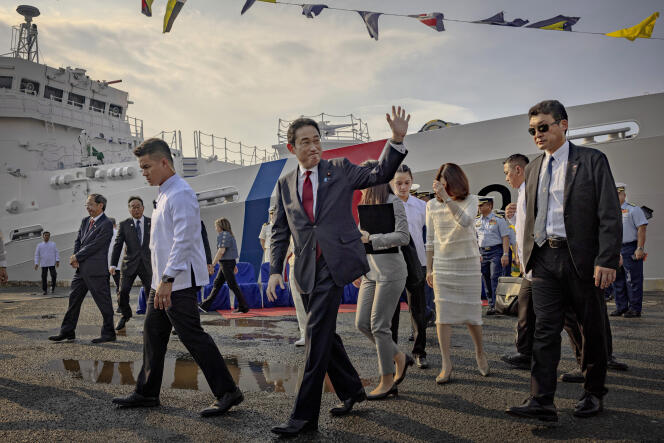The tectonic plates are shifting in Asian geopolitics, and the “quasi-alliance” being woven between Manila and Tokyo to counter China provides new proof of this. The new security arrangements, which will materialize in stages, were ratified during a visit to Manila on November 4 by Japanese Prime Minister Fumio Kishida, described as “historical” : this is the first time that a Japanese prime minister has spoken before the two houses of the Philippine Congress. The two countries undertake to open negotiations on a “reciprocal access agreement”a device proposed by Tokyo which will allow the Japanese Self-Defense Forces and the Philippine army to train and operate on their respective territories – in particular by facilitating the procedures for the entry of troops and weapons.
This type of agreement paves the way for what the Japanese press has described as a “quasi-alliance” similar to the one that Japan signed at the beginning of the year with Australia and the United Kingdom. Tokyo has changed its tune in Southeast Asia and decided, since 2022, to support its historic public development aid effort in favor of its former “sphere of co-prosperity”, during the Second World War, through targeted defense assistance, called Official Security Assistance (OSA). The Philippines is among the first to benefit, alongside three other countries, Malaysia, where Mr. Kishida visited after Manila, as well as Bangladesh, in South Asia, and the Fiji Islands, in the Pacific. This aid, in the case of the Philippines, concerns the provision of a coastal surveillance radar and several coast guard boats.
Japan, which was the first to bring forward, under the first mandate of former Prime Minister Shinzo Abe, in 2007, the concept of the Indo-Pacific, taken up by Washington ten years later, has been posed since this era as a defender of freedom of navigation in the face of Beijing’s claims in the East China Sea – where the Senkaku-Diaoyu islands are located, controlled by Tokyo but which China claims – and in the South China Sea, claimed by China at the expense of neighboring countries in Southeast Asia.
“Cooperation with the Philippines will ensure a world where human dignity is protected by maintaining and strengthening a free and open international order based on law”said Mr. Kishida before going to Manila, evoking the “trilateral cooperation to protect freedom of navigation” which is being set up between Japan, the Philippines and their American ally. Japan has largely reinterpreted, under the leadership of Mr. Abe in 2016, the constitutional constraints which hinder the deployment of its self-defense forces, now authorized to participate in security operations.“collective self-defense”.
You have 55% of this article left to read. The rest is reserved for subscribers.
